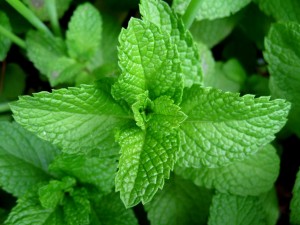Peppermint tea is one of the most popular herbal infusions. It's refreshing, the flavor is clean and sweet, and it feels good to drink after a heavy meal. But did you know that mint holds some of the best health benefits?! Recent studies have even showed that if exposed to the peppermint scent a few times a day, it actually lowers your appetite and in return makes you consume less calories per day.
Soothe Your Tummy With Peppermint
In the world of health research, trials have repeatedly shown the ability of peppermint oil to relieve symptoms of irritable bowel syndrome, including indigestion, dyspepsia, and colonic muscle spasms. These healing properties of peppermint are apparently related to its smooth muscle relaxing ability. Once the smooth muscles surrounding the intestine are relaxed, there is less chance of spasm and the indigestion that can accompany it. The menthol contained in peppermint may be a key reason for this bowel-comforting effect.
Potential Anti-Cancer Agent
Interest in peppermint has extended well beyond the digestive tract, however. Perillyl alcohol is a phytonutrient called a monoterpene, and it is plentiful in peppermint oil. In animal studies, this phytonutrient has been shown to stop the growth of pancreatic, mammary, and liver tumors. It has also been shown to protect against cancer formation in the colon, skin, and lungs. These animal-based studies have yet to be matched by equally sound human studies, however.
An Anti-Microbial Oil
Esssential oil of peppermint also stops the growth of many different bacteria. These bacteria include Helicobacter pylori, Salmonella enteritidis, Escherichia coli O157:H7, and methicillin-resistant Staphylococcus aureus (MRSA). It has also be found to inhibit the growth of certain types of fungus as well.
Breathe Easier with Peppermint
Peppermint contains the substance rosmarinic acid, which has several actions that are beneficial in asthma. In addition to its antioxidant abilities to neutralize free radicals, rosmarinic acid has been shown to block the production of pro-inflammatory chemicals, such as leukotrienes. It also encourages cells to make substances called prostacyclins that keep the airways open for easy breathing. Extracts of peppermint have also been shown to help relieve the nasal symptoms of allergic rhinitis (colds related to allergy).
A Rich Source of Traditional Nutrients
Peppermint also delivers a wide range of traditional nutrients. Peppermint is an excellent source of manganese, vitamin C and vitamin A, the latter notably through its concentration of carotenoids, including beta-carotene. Both vitamin C and beta-carotene seem to play a role in decreasing colorectal cancer risk. Vitamin C, the main water-soluble antioxidant in the body is needed to decrease levels of free radicals that can cause damage to cells. Some studies have shown a link between increased vitamin C intake and a decreased risk for colon cancer, possibly by as much as 40%, while other studies have shown that vitamin C intake can help to decrease the incidence of colon tumors. Beta-carotene and other carotenoids have been shown in some studies to decrease the risks of developing both colon cancer and rectal cancer. Carotenoids have also been shown to increase cell differentiation and protect cells against carcinogenic chemicals that could damage DNA. Vitamin A, which is structurally similar to beta-carotene, may help to decrease risk by preventing excessive colon cell proliferation and tumor formation.
In addition to all of the above healing properties, peppermint is a very good source of dietary fiber, folate, iron, magnesium, and calcium, vitamin B2 (based on its few calories and high nutrient density). This high nutrient density and low calorie status qualified peppermint as a good source of omega-3 fatty acids, vitamins B2, potassium and copper.
Information taken from The World's Healthiest Foods website.

No comments:
Post a Comment